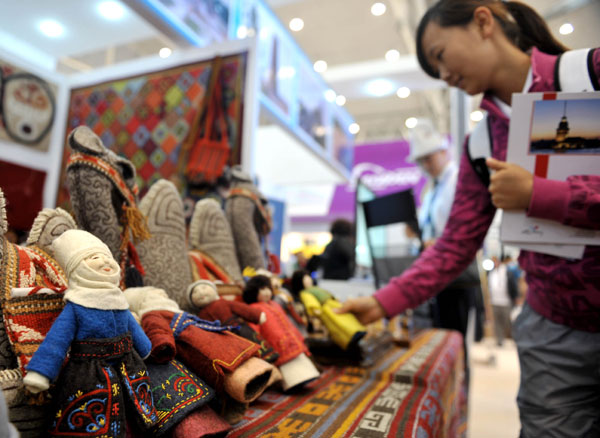China, Central Asia further cooperation urged
Updated: 2012-05-09 07:47
By Wang Huazhong in Tongxiang, Zhejiang and Wang Chenyan in Beijing (China Daily)
|
||||||||
 |
|
A woman looks at souvenirs from Kyrgyzstan at the China-Eurasia Expo in Urumqi, capital city of Xinjiang Uygur autonomous region, on Sept 1, 2011. Wang Fei / Xinhua |
Experts and former leaders from China and Central Asian countries called on Monday for the expansion of cooperation beyond ties in the energy sector.
"Energy is fundamental, but the economic ties between China and Central Asia are wide-range and multi-form," said Xing Guangcheng, a researcher at the Chinese Academy of Social Sciences.
China should "broaden the thinking" in its collaboration with Central Asia, Xing emphasized.
| ||||
Chinese energy enterprises have participated in oil and gas development in Kazakhstan, Turkmenistan and Uzbekistan.
China's role in Central Asia's energy sector remains small compared to Russia and the European Union.
Former leaders from five Central Asian countries and China vowed to diversify cooperation beyond the core sphere of fossil fuel on Monday at the China-Central Asia Cooperation Forum in Zhejiang Province.
Cooperation potential with "common interests" is especially huge in agricultural products, renewable energy technologies and transnational land transport, the former leaders said.
They also expressed the expectation of extending cooperation coverage from Northwest China - the place closest to Central Asia - to the economically powerful eastern and coastal parts of China.
"We can restore the glory of the ancient Silk Road," said Roza Otunbayeva, former president of Kyrgyzstan.
Zhanibek Karibzhanov, former deputy spokesman of the lower house of the Kazakhstan parliament, said his country, as one of the biggest exporters of flour and wheat in the world, can provide China with agricultural products.
Both the former foreign minister of Tajikistan, Talbak Nazarov, and Deputy Consul General of Uzbekistan in Shanghai, Makhmudov Shukhrat, said China can share its knowledge of solar and wind energy with the Central Asian side.
The two countries have favorable climates for solar energy. According to official estimates, the gross potential of renewable energy resources in Uzbekistan is equivalent to nearly 51 billion tons of oil.
Bilateral cooperation has been enhanced in educational, cultural and humanitarian areas, but "unfortunately" the focus of China and Uzbekistan cooperation in previous years has been around fossil fuel resources, Shukhrat told China Daily.
Chinese pro-communication organizations agreed and spoke highly of the potential of cooperation diversification beyond the traditional energy sphere with Central Asia.
The organizer of the forum, the Chinese People's Association for Friendship with Foreign Countries, said such cooperation is mutually beneficial.
Zhang Deguang, president of the China-Central Asia Friendship Association and former ambassador to Kazakhstan, said "increasing agricultural cooperation is especially important as it can safeguard food security and poverty relief to maintain stability".
Some groups in the West are suspicious about the motives behind Beijing's interest in the region.
"When we look at ties between China and Central Asian counties, we should start with the good-neighborly relations. And Beijing has relied on economic exchanges to benefit all of its partners while strengthening foreign relations," Xing said, adding that such principles are the foundation of the Shanghai Cooperation Organization.
Xing refuted what some western media have alleged, that "China is widening its muscular diplomacy".

 Relief reaches isolated village
Relief reaches isolated village
 Rainfall poses new threats to quake-hit region
Rainfall poses new threats to quake-hit region
 Funerals begin for Boston bombing victims
Funerals begin for Boston bombing victims
 Quake takeaway from China's Air Force
Quake takeaway from China's Air Force
 Obama celebrates young inventors at science fair
Obama celebrates young inventors at science fair
 Earth Day marked around the world
Earth Day marked around the world
 Volunteer team helping students find sense of normalcy
Volunteer team helping students find sense of normalcy
 Ethnic groups quick to join rescue efforts
Ethnic groups quick to join rescue efforts
Most Viewed
Editor's Picks

|

|

|

|

|

|
Today's Top News
Health new priority for quake zone
Xi meets US top military officer
Japan's boats driven out of Diaoyu
China mulls online shopping legislation
Bird flu death toll rises to 22
Putin appoints new ambassador to China
Japanese ships blocked from Diaoyu Islands
Inspired by Guan, more Chinese pick up golf
US Weekly

|

|








